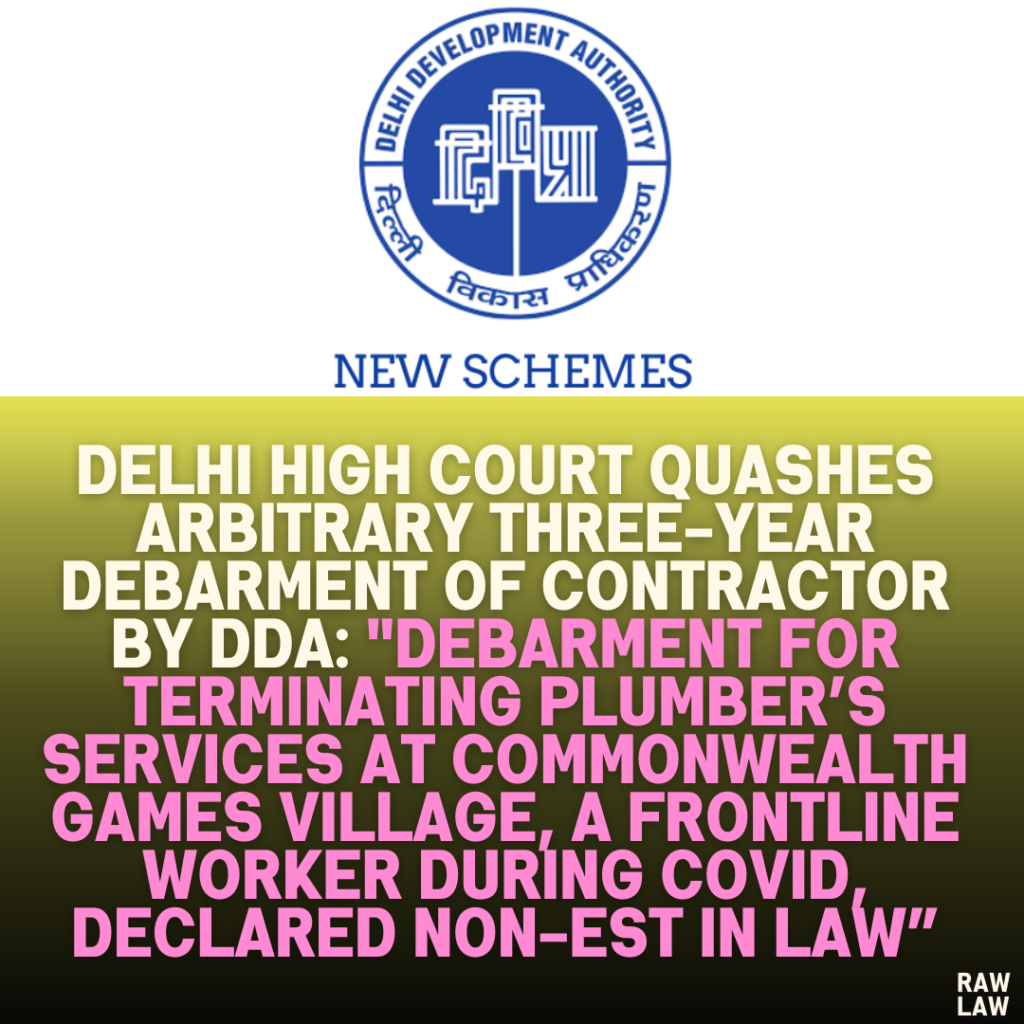Court’s Decision
The Delhi High Court ruled against the three-year debarment of the petitioner (a contractor) by the Delhi Development Authority (DDA), declaring it as lacking legal basis (“non est in law”). The Court found that while the contract’s termination could be justified based on its terms, the subsequent debarment for three years from participating in DDA tenders did not comply with the applicable rules and guidelines.
Facts
- Contractual Agreement:
- The petitioner was a service provider engaged in deploying manpower at the Commonwealth Games Village Sports Complex (CWGVSC), a facility operated by the DDA.
- The petitioner provided a plumber as part of its obligations under a work order for ₹3,33,975.
- Termination of the Plumber’s Services:
- The petitioner terminated the plumber for alleged misconduct, including marking attendance without being physically present and failing to wear a uniform during duty hours.
- This termination was done without prior approval from the DDA, allegedly violating the contract’s terms.
- COVID-19 Operations:
- During the pandemic, the CWGVSC was requisitioned as a COVID Care Facility. The plumber’s role became critical for maintaining essential services like water supply.
- The petitioner was informed of this requirement only after it had terminated the plumber’s services.
- DDA’s Actions:
- The DDA issued a show-cause notice, alleging that the petitioner violated multiple contract clauses and removed essential personnel without authorization.
- Following a hearing, the DDA debarred the petitioner from participating in tenders for three years, citing the violation of contract terms and misconduct.
Issues
- Did the petitioner violate the terms of the contract by terminating the plumber’s services without approval?
- Was the three-year debarment imposed by the DDA legally sustainable under relevant guidelines?
Petitioner’s Arguments
- Authority to Terminate: The petitioner argued it had the right to terminate the plumber for misconduct under its role as the employer.
- Timing of COVID-19 Guidelines: The petitioner pointed out that it was informed of the plumber’s critical role only after terminating the services. Hence, it could not have anticipated this requirement.
- Arbitrary Debarment: The three-year debarment was described as arbitrary, excessive, and unsupported by legal guidelines.
Respondent’s Arguments
- Violation of Contract Terms: The DDA maintained that the petitioner breached contract clauses by failing to ensure the continuity of essential manpower during the pandemic, which disrupted operations at the COVID Care Facility.
- Impact of Actions: The respondent emphasized that the plumber was a “frontline worker” during a public health crisis, and his removal without prior approval was a significant contractual violation.
Analysis of the Law
- Contract Terms and NIT Clauses:
- Clause 47(a) of the NIT outlined grounds for contract termination, such as failure to perform obligations or comply with contract terms. However, it did not explicitly require approval before terminating manpower.
- Guidelines on Debarment (GFR Rule 151):
- Rule 151 of the General Financial Rules (GFR), 2017, sets strict criteria for debarment:
- It applies only to bidders convicted of offenses like corruption or endangering public health.
- Debarment cannot be imposed arbitrarily; a fair opportunity to respond must be provided.
- Rule 151 of the General Financial Rules (GFR), 2017, sets strict criteria for debarment:
- Communication Delays:
- The Court noted that the petitioner was notified about the plumber’s role as a frontline worker only after terminating his services. Therefore, the petitioner could not be held solely responsible for any operational disruptions.
Precedent Analysis
The Court referred to the Ministry of Finance’s November 2021 guidelines on debarment, which state that:
- Debarment is valid only in cases of criminal conviction or proven breach of integrity.
- A bidder cannot be debarred unless due process, including a reasonable opportunity to respond, is followed.
These guidelines clarified that the DDA’s action lacked legal basis, as no such criteria were met in this case.
Court’s Reasoning
- Termination of Services:
- The petitioner acted within its rights as an employer to terminate the plumber for alleged misconduct.
- The DDA’s guidelines on maintaining essential personnel during the pandemic were communicated after the termination, absolving the petitioner of responsibility for the initial action.
- Debarment Decision:
- The Court found the DDA’s debarment decision legally unsustainable. Debarment requires specific legal grounds, such as a conviction for corruption or public endangerment, which were absent here.
- Proportionality and Fairness:
- The three-year debarment was disproportionate to the alleged contractual violation, especially since the petitioner had already faced penalties such as contract termination.
Conclusion
The Court allowed the petitioner’s writ petition, quashing the three-year debarment order. It held that while the DDA was justified in terminating the contract, the debarment lacked legal and procedural validity.
Implications
- Administrative Compliance:
- The judgment reinforces the need for government authorities to adhere strictly to statutory and procedural guidelines when imposing penalties.
- Protection Against Arbitrary Actions:
- This ruling ensures contractors are safeguarded from excessive and arbitrary penalties, promoting fairness in public procurement processes.
- Clarity in COVID-19 Guidelines:
- The case highlights the importance of timely and clear communication of operational guidelines, especially during emergencies like the pandemic.
